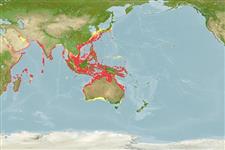Common names from other countries
Environment: milieu / climate zone / depth range / distribution range
Ecologia
marinhas bentopelágico; intervalo de profundidade 30 - 110 m (Ref. 9688). Tropical; 37°N - 43°S, 33°E - 157°E (Ref. 6181)
Indo-West Pacific: Red Sea, Mozambique Channel, Saya de Malha Bank, Chagos Islands, Andaman Sea, northern and southeastern Australia, South China Sea, East China Sea, Tasman Sea, Philippines, and southern Japan.
Tamanho / Peso / Idade
Maturity: Lm ? range ? - ? cm
Max length : 90.0 cm TL macho/indeterminado; (Ref. 6181); common length : 50.0 cm TL macho/indeterminado; (Ref. 6181)
Espinhos dorsais (total): 5; Raios dorsais moles (total): 126-144; Espinhos anais 2; Raios anais moles: 47 - 50. Body extremely elongate, compressed and tapering to a point. Pelvic fins reduced to scale-like processes; caudal fin absent. Lateral line running almost straight mid laterally nearer the ventral than the dorsal contour. Color is silvery white becoming silvery gray with dark cloud-like patches after death.
Benthopelagic or pelagic in coastal waters but not found where there is low salinity. Feeds mainly on small fishes, squids and crustaceans. Caught mainly with bottom trawls and sometimes with bag nets, mixed with other trichiurid fishes in southeast Asian countries. Marketed fresh and dried salted in the Philippines.
Life cycle and mating behavior
Maturidade | Reprodução | Desova | Ovos | Fecundidade | Larvas
Nakamura, I. and N.V. Parin, 1993. FAO Species Catalogue. Vol. 15. Snake mackerels and cutlassfishes of the world (families Gempylidae and Trichiuridae). An annotated and illustrated catalogue of the snake mackerels, snoeks, escolars, gemfishes, sackfishes, domine, oilfish, cutlassfishes,. scabbardfishes, hairtails, and frostfishes known to date. FAO Fish. Synop. 125(15):136 p. (Ref. 6181)
Categoria na Lista Vermelha da IUCN (Ref. 130435)
CITES (Ref. 128078)
Not Evaluated
Ameaça para o homem
Harmless
Utilização humana
Pescarias: pouco comercial
Mais informação
Nomes comunsSinónimosMetabolismoPredadoresEcotoxicologiaReproduçãoMaturidadeDesovaFecundidadeOvosDesenvolvimento dos ovos
ReferênciasAquaculturaPerfil para aquaculturaEstirpesGenéticaElectrophoresesHereditariedadeDoençasProcessamentoMass conversion
ColaboradoresFotografiasStamps, Coins Misc.SonsCiguateraVelocidadeTipo de nataçãoÁrea branquialOutras referênciasCérebrosVisão
Ferramentas
Relatórios especiais
Descarregue XML
Fontes da internet
Estimates based on models
Preferred temperature (Ref.
115969): 22.5 - 28.3, mean 27.2 (based on 500 cells).
Phylogenetic diversity index (Ref.
82804): PD
50 = 1.0000 [Uniqueness, from 0.5 = low to 2.0 = high].
Bayesian length-weight: a=0.00191 (0.00078 - 0.00466), b=3.11 (2.90 - 3.32), in cm Total Length, based on LWR estimates for this (Sub)family-body shape (Ref.
93245).
Nível Trófico (Ref.
69278): 4.2 ±0.58 se; based on food items.
Resiliência (Ref.
120179): Médio, tempo mínimo de duplicação da população 1,4 - 4,4 anos (Preliminary K or Fecundity.).
Fishing Vulnerability (Ref.
59153): Moderate vulnerability (38 of 100).
